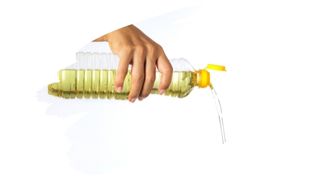One of the most time-honored ways to protect wood from rot and decay has always involved oil.
Two popular natural wood finishes, Tung oil and Linseed oil, have been used for centuries to help preserve wood.
But, not all oils are created equal. And, when it comes to wood finishing, you’d do well to give culinary vegetable oil a miss.
So, in this post, we reveal the safest type of wood oil finish you can use on a cutting board. We also explain how wood oils help to prevent wood rot — even without antibacterial additives.
And keep reading to discover why vegetable oil is the last thing you should use as a wood preservative.

This post may contain affiliate links to products that we receive a commission for (at no additional cost to you). Learn more here.
Can You Use Oil To Seal Wood In General? Is It Food-Safe?
It depends on the type of oil.
Wood finishing oils that dry and cure into durable solid coats, such as Tung oil and Danish oil, work well on wood.
These drying oils, provided that they’ve dried and cured through, form a food-safe seal on the surface of wood.
However, these oils are food-safe, not food-grade. What that means is that they are safe enough for indirect contact with food.
But, these oil finishes are not safely consumable. Which means they should not be used on any surface that will have direct contact with food.
So, if you want to seal something like a cutting board, you’ll need to use a food-grade wood oil.
Food grade wood finishes are non-toxic, and they’re often non-drying. But, most importantly, they do not pose a health risk if we happen to consume them.
That’s why 100% pure food grade mineral oil — and even fractionated coconut oil — work great on cutting boards.
Related Post: What Will Fractionated Coconut Oil Do To Your Cutting Board?
And What Is The Difference Between A Drying Oil And A Non-Drying Oil?
Well, it’s all in the name.
Drying oils go through a chemical reaction that turns them from a liquid into a dry hard durable substance. That chemical reaction is called ‘curing’.
Wood finishes such as Tung oil, Linseed oil, and Teak oil are all drying oils.
Non-drying oils, on the other hand, do not dry or cure. Instead, they stay permanently greasy — and in their liquid oily form.
Highly refined oils, such as mineral oil and fractionated coconut oil, are two such examples of non-drying oils.
And even unfiltered culinary oils, such as vegetable or sunflower oil, are also non-drying oils.
Related Post: Walnut Oil Vs Mineral Oil: Which One’s Better For Your Cutting Board?
But Does Oil Wood Actually Prevent Wood Rot?
It does, but not because it is some sort of fungicide.
Instead, penetrating oil finishes work by sinking down and coating wood fibers. They then act like a water-repelling seal, preventing those fibers from absorbing moisture.
If wood fibers were to absorb moisture — and stay damp — they would become the perfect meal for wood rot bacteria. Especially since bacteria love to feed on the proteins found inside natural solid wood.
So, by preventing water-absorption, oiling wood helps to prevent rot.
But, bacteria will feed on any protein it comes across. Which means that the oil itself could become a ready-meal for rot bacteria.
What Does This Mean Then? Can You Oil A Table Or Wood Cabinet With Vegetable Oil?
Not unless you like the smell of rancid vegetable oil in the morning…
You see, culinary vegetable oil is an unfiltered non-drying oil that does not cure. Which means that it contains a lot of stuff in it that bacteria love to eat.
As a result, vegetable oil can go bad and become rancid. Although it usually takes around a year for an opened bottle to go off.
Using vegetable oil to protect wood doesn’t change this food products end-by date. If you were to use it on wood, vegetable oil will eventually go rancid deep inside the grain.
Worse still, bacteria will begin to thrive on that rancid oil. And once a non-drying oil has sunk down into wood, next to nothing will be able to completely remove it.
How Long Does Vegetable Oil Last? In a cupboard, (and unopened), a bottle of vegetable oil can last a couple years. If opened, it will go off in half the time.
To Wrap Up, Here Are The 3 Key Takeaways From This Post…
- 1). Avoid using culinary oils as wood preservatives. These oils have a limited shelf-life, and if used on wood, they will become rancid.
- 2). If you want a food-grade wood oil finish, (suitable for cutting board surfaces), then use 100% pure food grade mineral oil.
- 3). Or alternatively, you can use pure food grade fractionated coconut oil.



